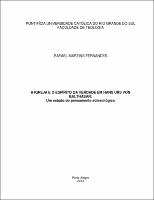| Share record |


|
Please use this identifier to cite or link to this item:
https://tede2.pucrs.br/tede2/handle/tede/5876| Document type: | Dissertação |
| Title: | A igreja e o espírito da verdade em Hans Urs von Balthasar : um estudo do pensamento eclesiológico |
| Author: | Fernandes, Rafael Martins  |
| Advisor: | Hackmann, Geraldo Luiz Borges |
| Abstract (native): | A presente dissertação de mestrado A Igreja e o Espírito da Verdade em Hans Urs von Balthasar, visa estudar e apresentar o pensamento eclesiológico de Balthasar sob a ótica pneumatológica. Dentro da imensa obra de Balthasar, selecionou-se para este estudo os seus principais escritos eclesiológicos e pneumatológicos. Apresenta, num primeiro momento, a vida, obras e o pensamento teológico deste autor suíço. Revela que o centro de sua complexa obra está na doutrina da Trindade e no acontecimento Jesus Cristo. Pensamento articulado de forma inovadora, com os transcendentais. Num segundo momento, discorre-se sobre a compreensão balthasariana de Igreja. A Igreja é então apresentada a partir de Cristo e de Maria, como pessoa feminina, colocada de frente a Cristo e respondendo a ele. Contribuem para o esclarecimento deste mistério, a união das imagens de Igreja como corpo de Cristo e esposa de Cristo. Nelas, a Igreja compreende-se como comunhão e missão. Mais precisamente, como mistério de comunhão de pessoas e missões em Cristo, formando sua pessoalidade. Neste mistério, destacam-se as figuras de Maria, Pedro e João. Aqui, Pedro personifica o ministério e a instituição. Maria é a figura que representa a totalidade da Igreja, com sua missão materna e esponsal. Num terceiro momento, analisa-se a ação do Espírito Santo neste mistério da Igreja. Para Balthasar, o Espírito Santo é fundamentalmente o Espírito explicador da Verdade do Pai o Filho encarnado. Então, na Igreja, o Espírito atua sempre junto ao Filho. Ainda, o Espírito derramado na Igreja junto à água e o sangue no evento da morte e resssurreição de Cristo, força a Igreja a encarnar-se, testemunhando aquele amor manifestado na cruz. Este trabalho encarnatório do Espírito na Igreja se dá de modo objetivo e subjetivo. A objetivação do Espírito ocorre nas mediações institucionais, como tradição, ministério, escritura e sacramentos. O modo subjetivo do Espírito atuar na Igreja, é percebido de maneira especial na oração, no perdão e no testemunho de vida. Balthasar, nesta complexa articulação, faz compreender melhor o trabalho conjunto da Trindade na Igreja. Oferece também uma visão diferenciada de Igreja, dinâmica, personalista, mistérica. |
| Abstract (english): | This Master's dissertation, The Church and the Spirit of Truth in Hans Urs von Balthasar, aims to study and present the ecclesiological thought of Balthasar from the pneumatological perspective. Within the immense work of Balthasar, his main ecclesiological and pneumatological writings were selected for this study. At a first moment, the life, works and theological thought of this Swiss author are presented. It reveals that the center of its complex work is in the doctrine of the Trinity and the event Jesus Christ. Thought articulated in an innovative way, with the transcendentals. At a second moment, Balthasar's understanding of the Church is discussed. The Church is then presented from Christ and Mary, as a female person, placed in front of Christ and responding to him. The union of the images of the Church as body of Christ and spouse of Christ contribute to the clarification of this mystery. In them, the Church is understood as communion and mission. More specifically, as mystery of communion of people and missions in Christ, forming his personality. In this mystery, the figures of Mary, Peter and John stand out. Here, Peter personifies the ministry and the institution. Mary is the figure who represents the totality of the Church, with its maternal and espousal mission. At a third moment, the action of the Holy Spirit in this mystery of the Church is analyzed. For Balthasar, the Holy Spirit is fundamentally the Spirit "explainer" of the Truth of the Father − the incarnated Son. Then, in the Church, Son and Spirit act together. Still, the Spirit, which is poured into the Church with water and blood, in the event of Christ's death and resurrection, forces the Church to incarnate itself, testifying that love manifested in the cross. This "incarnating" work of the Spirit of the Church occurs in an objective and subjective way. The objectification of the Spirit takes place in the institutional mediations, as tradition, ministry, scripture and sacraments. The subjective mode of the Spirit acting in the Church is perceived in a special way in prayer, forgiveness and in the testimony of life. Balthasar, in this complex articulation, helps to better understand the joint work of the Trinity in the Church. It also offers a differentiated view of Church, dynamic, personalist, mysterious. |
| Keywords: | RELIGIÃO TEOLOGIA IGREJA CATÓLICA BALTHASAR, HANS URS VON - CRÍTICA E INTERPRETAÇÃO TRINDADE |
| CNPQ Knowledge Areas: | CNPQ::CIENCIAS HUMANAS::TEOLOGIA |
| Language: | por |
| Country: | BR |
| Publisher: | Pontifícia Universidade Católica do Rio Grande do Sul |
| Institution Acronym: | PUCRS |
| Department: | Faculdade de Teologia |
| Program: | Programa de Pós-Graduação em Teologia |
| Access type: | Acesso Aberto |
| URI: | http://tede2.pucrs.br/tede2/handle/tede/5876 |
| Issue Date: | 13-Jan-2014 |
| Appears in Collections: | Programa de Pós-Graduação em Teologia |
Files in This Item:
| File | Description | Size | Format | |
|---|---|---|---|---|
| 454277.pdf | Texto Completo | 864.85 kB | Adobe PDF |  Download/Open Preview |
Items in DSpace are protected by copyright, with all rights reserved, unless otherwise indicated.




